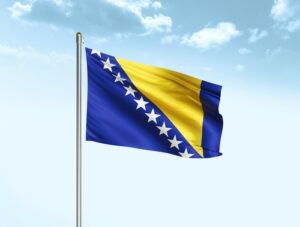
U.S. Reps. Ann Wagner (R-MO) and Mike Turner (R-OH) on July 18 introduced bipartisan legislation that would codify U.S. sanctions to address the political crisis and corruption in Bosnia and Herzegovina.
Ethno-nationalist politicians like Milorad Dodik, the Serb leader of Bosnia’s tripartite government, have precipitated a crisis in Bosnia by calling for a boycott of Bosnia and Herzegovina (BiH) government institutions and setting up alternate, Serb-led institutions. Dodik has threatened secession for years, but these actions have put BiH’s future as a unified state in doubt, according to the lawmakers.
“This bill will ensure we impose sanctions on these destabilizing criminals and deter bad actors, including Russia, from gaining a foothold in the region,” said Rep. Wagner, who sponsored the Upholding the Dayton Peace Agreement Through Sanctions Act, H.R. 4723, alongside three original cosponsors, including Rep. Turner and U.S. Rep. Susan Wild (D-PA).
If enacted, H.R. 4723 would provide for the imposition of sanctions with respect to foreign persons undermining the Dayton Peace Agreement or threatening the security of BiH, according to the congressional record.
“As vice chair of the House Foreign Affairs Committee, and Representative of the largest Bosnian community outside of Bosnia and Herzegovina, I know just how important it is we uphold stability in the region and stand strong against destructive politicians who seek to undo years of peace,” Rep. Wagner said. “We will not allow corrupt politicians in Bosnia, often backed by the Putin regime, to threaten the Dayton Accords and make life that much more dangerous for all those in the region.”
Specifically, H.R. 4723 would state that it is the policy of the United States to support a unified, sovereign, and multiethnic BiH; use sanctions against those who undermine the Dayton Accords and Bosnian democratic institutions; encourage the European Union to join the U.S. in sanctioning Dodik; expose Russia’s role in fueling instability in BiH and imperiling multilateral peacekeeping efforts; and work to protect the Office of the High Representative, according to a summary provided by the lawmakers.
Additionally, H.R. 4723 would codify, tailor, and mandate the authority to impose sanctions on foreign persons and adult family members who undermine the Dayton Accords or otherwise threaten the security of BiH. Sanctions would be imposed for forming or participating in forming parallel breakaway institutions; violating or obstructing the implementation of the Dayton Accords, including by threatening the Office of the High Representative; and undermining Bosnia’s democratic institutions.
The measure also would require robust and regular reporting to establish strong oversight, the summary says.
“As the mayor of Dayton during the historic Dayton Peace Accords in 1995, I understand the importance of diplomacy and constructive engagement in resolving conflicts. Achieving peace is not easy, but it is something that America should support as an advocate for international order and the rule of law,” said Rep. Turner. “However, peace agreements are only sustainable if all parties are willing to come to the table.”
Rep. Turner added that H.R. 4723 would demonstrate the United States’ dedication to advancing security and preventing violence.
“By holding accountable those who undermine peace agreements, we send a strong message that the international community will not tolerate actions that perpetuate conflict and human suffering,” he said.
Rep. Wild also said that the U.S. must support the people of BiH, who are facing conflict and sectarianism as they attempt to grow democracy.
“Critically, this bill calls on Bosnia and Herzegovina to implement the rulings of the European Court of Human Rights, which require an end to existing ethnic and religious requirements on holding high-ranking political office — an unacceptable barrier for citizens of Jewish and Roma backgrounds, as well as all other citizens who do not fall within the three protected ethnic communities,” she said.



